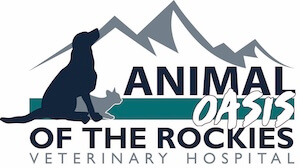Is your dog suffering from allergies? At Animal Oasis of the Rockies Veterinary Hospital, we offer comprehensive allergy testing and tailored dog allergy treatments to alleviate your dog's discomfort. Our services include immunotherapy, anti-itch medications, and topical therapies to address environmental and food-related allergies. Don't let your pet endure unnecessary itching or inflammation—contact us today to schedule an appointment and help your dog find relief.
How common are allergies in dogs?
Very common. I think a big misconception though is what type of allergies dogs have. So a lot of people think that they have food allergies, but in fact, it's very common, especially in Colorado, to have environmental allergies. So food allergies are about 20% of the time, while environmental is about 80% of the time. Common dog allergies. So like I said, environmental is more common, so think like grasses, pollens, I mean really anything. Here in Colorado, it's like the wind blows and allergies will pick up. As far as food allergy goes, another misconception that people have is that it's related to grains or other things. It's actually more common to be associated with the animal protein. So think beef is the number one and chicken is number two.
Dr. Keli Vandenheuvel
Animal Oasis of the Rockies
How would allergies impact the health and well-being of my dog?
Well, think about it like this: if your dog has uncontrolled allergies, one, it can just be detrimental to their health because they're constantly itching, they're keeping you up at night, they just look uncomfortable. But also, they're in a chronic state of an inflammatory process, so that's just not good for them.
What are some signs and symptoms of allergies in dogs that I should look for?
I mean really for environmental and food, and again I'm just going to kind of go over both, is like environmental, think paw licking, redness between their toes, licking in their thigh, like if they're stopping on walks and itching, or like if you notice when they're running in the grass and they come in and they're like more itchy after they go outside. Ear infections definitely, in food allergies, we tend to see more gastrointestinal effects, so like chronic diarrhea, generalized issues with itching, and ear infections.
Can an owner diagnose dog allergies at home?
I wish, and this is partly true because I think what you guys tell me is really helpful, like wow, we're really licking our paws and things like that, so you can't really diagnose it unless you come to see me.
How would you diagnose allergies in my dog?
So really it's a good physical exam, kind of going over when the licking or the itching or the clinical signs occur and how frequently they occur, if there's a seasonality to it. The biggest thing I want people to know is you have to do cytology to help diagnose allergies. So most often times there's an allergy, but then what happens is a secondary infection, and so those cytologies really help us diagnose the secondary infection, which can be very very important for controlling your dog's allergies.
What types of different medications would you prescribe for my dog with allergies?
I think overall that's the goal of the client, and so if it's to stop clinical signs, so let's say your dog is itching, then we have things that are like anti-itch medications that we can use for allergies. If your goal is to stop the redness between the toes, or to stop the itching, or to really target the primary allergy, there are things that you can do like immunotherapy, which is where we basically allergy test your dog and then make a little vaccine, and we slowly get the body used so that the body doesn't freak out every time your dog comes in contact with that allergy. That oftentimes has to be with a dermatologist, but we can help set that up for you.
Do you recommend shampoo therapy for my dog's allergies?
Yes, in fact, most allergy dogs need more frequent bathing than we think they do. So topical therapy is a huge component of allergy treatment, okay, so it's really hard to over bathe your dog, and depending on what kind of allergy or skin condition they have, bathing can actually improve it, and so I always like to tell people that it's really really hard to over bathe your dog, but actually it can be really beneficial because if you think about it, every time you bathe your dog, you're going to go ahead and reduce the allergen impact on their skin, and so less allergens means less itching.
If you have any other questions, please give us a call at (303) 900-7765. You can also email us at [email protected] and we will get back to you as soon as we are able. Don't forget to follow us on social media: Facebook and Instagram
